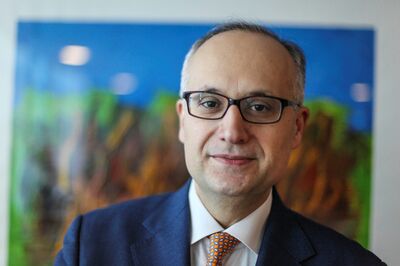Ecomondo 2022 Interview : How can the waste sector face the current challenges?

What are the biggest challenges for the waste sector?
Waste management is a universal issue affecting the daily health, productivity and cleanliness of communities. Poorly managed waste is contaminating the world’s oceans, clogging drains and causing flooding, transmitting diseases, increasing respiratory problems through airborne particles and affecting economic development.
Growing prosperity and the expansion of urban areas have increased the per capita generation of waste. According to recent estimates, the global waste production from cities alone is about 1.5 billion tonnes; this figure is expected to increase to 2.3 billion tonnes by 2025. Furthermore, urban waste management is expensive and is one of the main costs for cities in low-income countries. Thus, the collection of all waste and the procuring of land for treatment and disposal have become difficult in many cities, countries and continents.

Thus, the main common challenges of the sector include:
- limited abilities of local authorities to administer waste management due to their limited resources and capacity for planning, contract management, operational monitoring, etc;
- lack or scarcity of data on how much waste is generated and the types of waste being generated; this has not allowed local governments to select appropriate management methods (e.g. number of vehicles, targets for diversion of waste, track progress, waste generation patterns change), assess and acquire suitable technologies, consider strategic partners for service provision and plan for future demand;
- low and different standard recyclables, which depend to a considerable extent on geographical features, with quality varying by region;
- the lack of effective and sustainable solutions for the management of some waste that presents significant risks for employees and the environment, such as combustible materials, chemical waste, machine-related hazards, etc.;
- lack of skilled workers to handle machines properly but also updating and innovation of the machinery deployed to collect garbage, to store and recycle waste and store data.
Developing countries often display an array of other problems, including low collection coverage and irregular collection services, unpolished open dumping and burning without air and water pollution control, etc. Development of effective waste management systems in these countries is quite demanding due to the absence of technical, financial, institutional, economic and social factors. In Europe, there is potential to increase the percentage of material collected for recycling in construction and demolition waste (C&DW), municipal solid waste (MSW) and waste electrical and electronic equipment (WEEE) waste streams. In absolute terms, the largest potential appears to exist in the MSW stream, calculated at approximately 111 or 139 million tonnes (depending on the method used). In relative terms, WEEE shows the highest increase in potential for recycling (+103% or +112%, depending on the method used). However, the recycling of C&DW, MSW and WEEE is adversely affected by a) the low market price for natural resources/virgin raw materials followed by the mixed and complex composition of the waste stream, which causes problems in waste treatment (processing), b) the low degree of regulation and low levels of enforcement, that are not speeding up/enabling the recycling of C&DW, MSW and WEEE, and c) the lack of effective measures that can help improve the economics of recycling.
These factors, again among others, make sustainable waste management a complicated proposition on the path of economic development, and most low- and middle-income countries and their cities struggle to address the challenges mentioned above.
What needs to be done to transition to more sustainability in the waste sector?
The adequate assessment of the composition and volume of waste can be a deciding factor in choosing an efficient way to manage its disposal. Other important measures include:
- introducing and adopting the most effective legislation and regulations;
- ensuring full accessibility of all waste for collection;
- better engagement and information, via regular audits, of the stakeholders responsible for the management and control measures of the waste management;
- training and management of the employees. Proper training and motivation of employees are necessary for delivering qualified services responsibly and diligently in the waste management industry, which sometimes innovates technologies and processes for addressing the new needs of the circular and green economy;
- improving the existing level of local public awareness.
In developing countries with political instability, social unrest and widespread poverty, the education and implementation of efficient waste management can be achieved via the involvement of NGOs that are able to identify and train key individuals, work with whole communities and implement sustainable change within municipalities and governments.
In Europe, a higher degree of regulation and higher levels of enforcement can be strategic enablers for the management and recycling of all three main waste streams, i.e. C&DW, MSW and WEEE. Adequate sanctions for offenders would be important for MSW and WEEE recycling. Then, measures that can help the economics of recycling along with support for the waste hierarchy would be useful for C&DW, MSW and WEEE management and recycling. For C&DW and MSW, financial incentives such as landfill taxes to discourage landfilling would be interesting enablers. Design for disassembly would be an enabler for all three main waste streams. Finally, having a sufficient number of waste treatment facilities that can deal with key material streams would be strategic for successful C&DW and MSW recycling.
In developing countries with political instability, social unrest and widespread poverty, the education and implementation of efficient waste management can be achieved via the involvement of NGOs.Fabio Fava
What impact did the pandemic have on the waste management sector?
The COVID-19 pandemic had a tremendous impact on the waste sector. Public authorities and municipal waste operators had to rapidly adapt their waste management systems and procedures during the lockdowns to protect their customers and employees while maintaining the crucial services of waste collection and treatment. The onset of the COVID-19 pandemic led to the introduction of social distancing measures and encouraged the buying of food, face masks, gloves, cleaning products and 70% alcohol-based hand sanitisers along with the disposal of perishable products and leftovers and the use of conventional plastics.
Due to low oil price and demand, the competitiveness of recycled and biobased plastics has declined, affecting the price of virgin plastics. In Europe, glass and paper recycling were also significantly impacted. The value chains have been interrupted. A lot of the recycling plants were closed during the lockdown and the different waste fractions remained at the transfer stations.

Many people had more time available and cleared out their houses; in Europe, this resulted in long lines in front of recycling centres accepting bulky waste, waste electrical and electronic equipment, second-hand textiles, etc. And throughout Europe, the illegal dumping of waste increased, and the new personal protective equipment (PPE) waste stream entered streets and household bins. Face masks are reported to have piled up at nature trails and beaches on different continents due to improper disposal in waterways, which disrupts the marine environment.
Then, there was the waste produced by infected people who were self-isolating at home. According to the World Health Organization and other national healthcare institutions, such waste should be considered hazardous (infectious) waste and treated as such. In practice, local authorities have been required to treat it as mixed waste and implemented specific safety measures for collection, such as using two sealed bags and, in some countries, storing the waste for 72 hours before putting it out. These precautions have normally also been required for all PPE.
Furthermore, in some European countries, mechanical biological treatment plants were shut down due to the pandemic, especially during lockdown, and mixed household waste was landfilled or incinerated. Thus, the pandemic adversely affected or significantly delayed the European implementation of the circular economy.
The temporary ban on cross-border movements greatly affected developing countries that depend on foreign technology for waste recycling activities, hence most of the waste generated during the pandemic was disposed of rather than recycled.
Can you tell us more about the events programme: how did you choose the topics and what are the highlights?
Some of the events at the 2022 edition of Ecomondo are designed to assess the current challenges, needs and opportunities of waste management and of the adoption of the EU Circular Economy Implementation Plan in Italy, Europe and the Mediterranean area, with the direct contribution of the representatives of the main industrial associations, municipalities, research and innovation entities and public administrations of the areas mentioned, along with the EU Commission, OECD, ISWA and other international organisations.
Other events will be focused on the state of implementation of the Italian “Next Generation Europe” programme, and in particular of its mission on the national green and ecological transition, with the direct contribution, also in this case, of the representatives of the main national industrial sectors and administrations and of director generals of the main ministries leading the programme.
A third group of events will be focused on the EU Green Deal priorities associated with urban, soil and hydrosphere ecosystems restoration and regeneration and sustainable bioeconomy and blue economy, also in line with the EU Missions in Horizon Europe and in close cooperation with the EU Commission and the coordinators of EU projects funded on the same priorities. Industrial case studies and demo cases along with research and innovation priorities and new policies are on the agenda of the events, mainly hosted on the 130,000 square meters of the exhibition area, to ensure a wide stakeholder participation, networking and partnership creation. Some of the events also deal more specifically with financing, communication, education and international cooperation on the main priorities of the wide domains of the ecological transition.
What are the main goals of the Ecomondo events programme?
The pandemic highlighted the need to accelerate the transition of our industry towards climate neutrality and the adoption of the circular economy in the different industrial and urban landscapes, to also become more resilient and less dependent on major international powers.
Ecomondo 2022 events will contribute to the adoption of policies and innovation enabling the intensification and extension of the circularity and sustainable use of renewable raw materials within the main European industrial chains, bringing the best technological innovation available into the territorial realities, also aligning financing, partnership creation and networking, communication, education and international cooperation, to make the industrial transition competitive and inclusive.
But reducing the impact on the environment is no longer sufficient on its own. It is now necessary to start regenerating it in order to ensure that land, sea and related ecosystems are once again healthy and resilient, to guarantee quality products and services, and to address the current and future essential needs of biomass and raw materials.
For these new and emerging priorities, information, co-planning and the setting up of dedicated public-private partnerships, local and international, are needed. The Ecomondo 2022 conferences will also contribute to addressing these needs, facilitating public-private alliances, networking of operators and institutions in the definition and adoption of regulatory, innovation, financial, training and internationalisation cooperation on those priorities and the post-pandemic industrial, economic and social regeneration.


